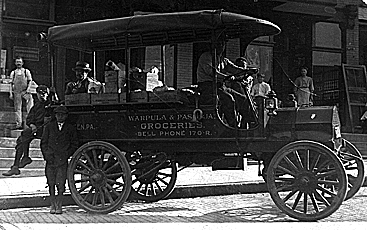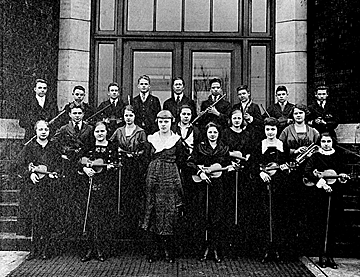
I grew up on Motheral Avenue in the center of the Finnish section of Monessen. My father and Mike Warpula had a grocery store at the corner of Motheral Avenue and Fourth Street. It had been moved from downtown Monessen to this location in 1912. In an early advertisement, European foods like Finnish lingonberries, Finnish sardines, Norwegian sill, and salt salmon were recommended.

Other Finnish businesses in this area were Ruuti's Ice Cream parlor, Issac Saxberg's Tailor Shop and Heikkinen's Barber Shop. The three story Temperance Hall was also nearby.
One block away at the opposite end of Motheral Avenue was the Socialist Hall. Near this hall was Kuosmanen's Plumbing Supply Store, Seppeliini's Tailor Shop, Sampo Cooperative, and across the street was a blacksmith shop. At the corner of Motheral Avenue was Nevapeta's Shoe Store with Nahi's Dry Goods Store across the street. Ilmari Lehto's Nickelodeon was also near the Socialist Hall. It cost five cents to see the show. The accompaniment was a player piano that I sometimes played. The music was always sad regardless of the movie. Other stores in the area were Kitinoja's Ice Cream Parlor, Knuttila's Bakery and Tuori's Steam Bath. Tuori's also made soda pop.
Knuttila's Bakery was well known since it was the only Finnish Bakery in the area. Mr. Knuttila delivered for miles around. Every week he made "Kranssi" which was a special coffee bread with a hole in the center. The other coffee cakes were named Korvapuusti, Ankkastukki, and Assan Varri.
After my father went out of business, the Finns opened a cooperative with Mike Warpula as the manager. I worked there as a bookkeeper and made out the dividend checks to all the shareholders. Ellen Wiita and I also worked as clerks. Here we heard many different Finnish dialects. Apparently, some vegetables had different names in various regions of Finland.
The men spent a great deal of time on the steps of Ruuti's Ice Cream Store in the summertime. The talk was always about the tin mill. It got to be that Ellen and I knew the exact terminology for rolling tin plate as we listened to this conversation six days a week.
The single men whose families were still in Finland lived in boarding houses and took all their meals in the restaurant in the basement of the Temperance Hall. The lunches that they took to the mill were also packed there. The men sometimes invited Ellen and myself to have coffee at the hall. Ruuti's Ice Cream Store had a white marble counter and wire back chairs. In another room was a record player where Finnish music and popular tunes were played.
My family was musically inclined. My father played trombone in the Louhi Band. I started to take piano lessons when I was six years old. My four brothers played instruments and became members of the Louhi Band, also. Brother Ernie became a professional musician and played for the Horace Heidt Orchestra and later in the NBC studios in Chicago. Brother Paul became a music teacher and was the last conductor of the Louhi Band. When I was still in grade school, I was asked to play piano in the high school orchestra when their pianist graduated. All the Finnish members of the high school orchestra also played in the Finnish Church Orchestra. Mr. Wahlstrom conducted both orchestras. He was also director of the Louhi Band and the Finnish chorus.

In our early teenage years we had to attend six weeks of summer school at the church each year. We learned to read in the Finnish language, and we studied Finnish history. This was done under the direction of the Finnish Lutheran pastor. At the time it was difficult to understand why we should spend our summers learning about Finland. It did come in handy many years later when I visited Finland.
The center of activity in the early Finnish community was the church on Reed Avenue, the Temperance Hall, and the Socialist Hall. In later years the Socialist Hall was the first to close. Many years later the Temperance Hall also closed.
During my childhood years the Temperance Hall was a busy place. The Louhi Band practiced there on Wednesday nights and Sunday mornings. There were gymnastics, wresting matches, plays, and dances. I performed in some of the plays. These plays were sometimes taken to other Finnish communities like Wierton, West Virginia and Ashtabula, Ohio. As a teenager I also played piano in a dance band.
The Finnish Lutheran Church has survived them all. It is now St. Luke's Lutheran Church and serves the needs of people of all origins. One of the church's most successful fund-raising activities is its bake sale. The men and women of the church use the old Finnish bakery recipes to bake bread and coffee bread (pulla) in the church kitchen. The Finnish heritage still lives on.
In 1925, I left Monessen to go into nurses training at West Penn Hospital. After graduation I continued on as a nurse at the same hospital for many years. Most of those years I was the head nurse in the pediatrics division. After my marriage to Charles Niemela, I came back to the Monongahela Valley and continued to be a nurse a the Charleroi-Monessen Hospital.
I remained a member of St. Luke's Lutheran Church. Although the services are now conducted only in English, the church is still a reminder of the past. Those early years were busy and happy years.
Learn more about the Louhi Band and Monessen Finnish culture
• The Monessen Finnish Louhi Band by Eva Niemela Passoja
• Paul Passoja, the Last Conductor of the Louhi Band by Everett Arthur Niemela